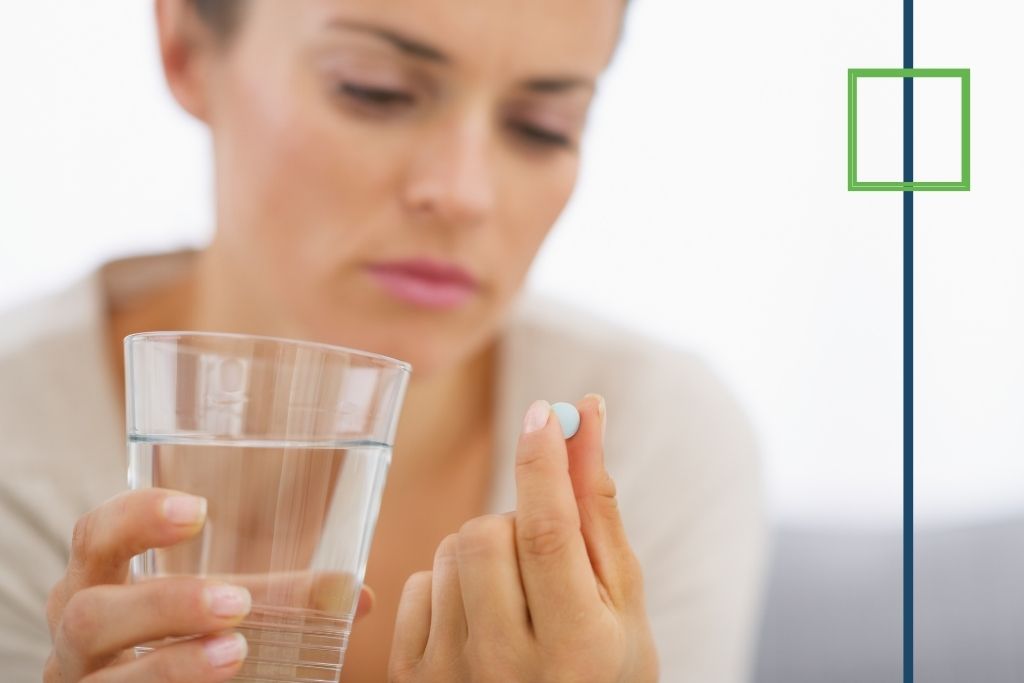What About Tramadol?
Tramadol (Ultram) is used to relieve moderate to moderately severe pain. Tramadol extended-release tablets and capsules are only used by people who are expected to need medication to relieve pain around the clock [1]. It is in a prescription drug called opioid analgesics. It works by changing the way the brain and nervous system respond to pain.
Take this medicine only as directed by your doctor and do not take it for a longer time than your doctor ordered. It is very important that you understand the rules of the Opioid Analgesic REMS program to prevent addiction, abuse, and misuse of acetaminophen and codeine combination. Alcohol and Tramadol interactions combine the dangers of both and result in intensified consequences for the user.
In 2014, Tramadol went from being viewed as a drug of concern to a Schedule IV controlled substance by the US Food and Drugs Administration (FDA) [2]. Also, FDA recommends against the use of Tramadol in pregnancy. The use of tramadol with serotonergic medicines can increase the risk of serotonin syndrome. Tramadol serotonin syndrome can be a life-threatening emergency and should be managed in an acute care setting.


Get Your Life Back
Find Hope & Recovery. Get Safe Comfortable Detox, Addiction Rehab & Mental Health Dual Diagnosis High-Quality Care at the We Level Up Treatment Centers Network.
Hotline (877) 378-4154What is Serotonin Syndrome?
Serotonin syndrome is a severe drug reaction. It is caused by medications that build up high serotonin levels in the body. Serotonin is a chemical that the body produces naturally. It’s needed for the nerve cells and brain to function. But too much serotonin causes signs and symptoms that can range from mild (shivering and diarrhea) to severe (muscle rigidity, fever, and seizures). Severe serotonin syndrome can cause death if not treated [3].
Serotonin syndrome can happen when you increase the dose of certain medications or start taking a new drug. It’s most often caused by combining medications that contain serotonin, such as an antidepressant and migraine medication. In addition, some illicit drugs and dietary supplements are linked with serotonin syndrome.
Milder forms of serotonin syndrome may go away within a day or two of stopping the medications that cause symptoms and, sometimes, after taking drugs that block serotonin. Moderate cases can be treated as above with the addition of a serotonin antagonist and admission to the hospital for cardiac monitoring and observation. In severe, life-threatening cases, the patient should be treated as above with the addition of sedation, paralysis, and intubation/ventilation in the intensive care unit.
Serotonin Syndrome Symptoms
Your body makes serotonin to help your brain cells, and other nervous system cells communicate with each other. Researchers think a lack of serotonin in your brain may play a role in depression. But too much of it can lead to extreme nerve cell activity and dangerous symptoms.
Serotonin syndrome symptoms often begin hours after you take a new medication that affects your serotonin levels or after you raise your dose of a current drug. Symptoms may include:
- Confusion
- Agitation or restlessness
- Dilated pupils
- Headache
- Changes in blood pressure and/or temperature
- Nausea
- Vomiting
- Diarrhea
- Rapid heart rate
- Tremor
- Loss of muscle control or twitching muscles
- Shivering and goosebumps
- Heavy sweating
In severe cases, serotonin syndrome can be life-threatening. Call 911 or go to the emergency room if you have any of these symptoms:
- High fever
- Seizures
- Uneven heartbeat
- Passing out
Get Help. Get Better. Get Your Life Back.
Searching for Accredited Drug & Alcohol Rehab Centers Near You? Or Mental Health Support?
Even if you have failed previously, relapsed, or are in a difficult crisis, we stand ready to support you. Our trusted behavioral health specialists will not give up on you. Call us when you feel ready or want someone to speak to about therapy alternatives to change your life. Even if we cannot assist you, we will lead you wherever you can get support. There is no obligation. Call our hotline today.
FREE Addiction Hotline – Call 24/7Serotonin Syndrome Causes and Risk Factors
Medications usually cause serotonin syndrome, especially certain antidepressants. You might be at higher risk if you take two or more drugs and/or supplements that affect your serotonin levels.
Selective serotonin reuptake inhibitors (SSRIs) are the most commonly prescribed class of antidepressants. They work by raising your serotonin levels. These drugs include:
- Citalopram (Celexa)
- Escitalopram (Lexapro)
- Fluoxetine (Prozac)
- Fluvoxamine (Luvox)
- Paroxetine (Paxil)
- Sertraline (Zoloft)
How Does Tramadol Cause Serotonin Syndrome?
Tramadol is a pain reliever that works by altering how the brain and nervous system react to pain. In addition to being a mu-opioid receptor, this drug inhibits the reuptake of serotonin and norepinephrine in the brain. Tramadol increases the concentration of serotonin in the synapses between the serotonergic neurons found in the brain stem. This extra serotonin causes some of the positive effects of the medication, such as pain relief.
If too much serotonin builds up in the synapses between the brain cells, this can lead to serotonin toxicity, also known as serotonin syndrome. Using this opioid pain medication alone could result in serotonin syndrome, mainly if a person takes too much of the medication or takes more than prescribed.

Serotonin syndrome is often associated with antidepressants that act on serotonin in the brain (SSRIs). It can be triggered by a dose increase or the addition of another medication that also works on serotonin levels.
It can also occur from overdosing on a prescription medication that floods the brain with serotonin. According to the National Center for Biotechnology Information (NCBI) [4], tramadol can increase the risk for serotonin syndrome in those who are on antidepressants. Chronic pain and depression are common co-occurring disorders, and tramadol may often be used along with a selective serotonin reuptake inhibitor (SSRI) antidepressant.
When this drug is combined with an SSRI that has the same effect on serotonin, the result can be serotonin syndrome. This prescription drug has also been identified to be risky when used with mirtazapine and olanzapine.
There is a bigger risk when taking Tramadol: serotonin syndrome and seizures which can be caused by many factors, including:
- Patient comorbidities such as heart disease
- Use of illegal drugs
- Use of certain dietary supplements
- A general toxic effect experienced in about 15 percent of all Tramadol-overdose patients
- Drug interactions
Comfortable Facilities & Amenities
High-Quality Addiction & Mental Health Rehabilitation Treatment
Rehab Centers TourRenowned Addiction Centers. Serene Private Facilities. Inpatient rehab programs vary.
Addiction Helpline (877) 378-4154Proven recovery success experience, backed by a Team w/ History of:
15+
Years of Unified Experience
100s
5-Star Reviews Across Our Centers
10K
Recovery Success Stories Across Our Network
- Low Patient to Therapist Ratio
- Onsite Medical Detox Center
- Comprehensive Dual-Diagnosis Treatment
- Complimentary Family & Alumni Programs
- Coaching, Recovery & Personal Development Events
Are there Risk Factors for this Interaction?
Tramadol accounts for a significant number of drug interactions. For example, an Australian veterans study examined adverse drug interactions in 46,859 participants taking antidepressants. Of the 8.1 percent who experienced these interactions, tramadol was the most often implicated drug (3.6%).
Of these various interactions, this opioid pain medication has the potential to trigger two dramatic events—seizures and serotonin syndrome. These may develop during tramadol monotherapy either at routine or excessive doses but are particularly likely during tramadol coadministration with antidepressants. In addition to antidepressants, this drug may interact with a number of other psychotropic drugs, including antipsychotics and anticonvulsants.
How is Serotonin Syndrome Identified?
No single test can confirm a serotonin syndrome diagnosis. Your doctor will diagnose the condition by ruling out other possibilities. Your doctor will likely begin by asking about your symptoms, medical history, and any medications you’re taking. Your doctor will also conduct a physical examination.
To make sure your symptoms are caused by serotonin syndrome and not due to another cause, your doctor may use tests to:
- Measure levels of any drugs you’re using
- Check for signs of infection
- Check body functions that may be affected by serotonin syndrome
A number of conditions can cause symptoms similar to those of serotonin syndrome. Minor symptoms can be caused by several conditions. Moderate and severe symptoms similar to those of serotonin syndrome could be caused by:
- A serious reaction to certain medications, such as some anesthetics, antipsychotic drugs and other agents known to produce these severe reactions
- An overdose of illicit drugs, antidepressant medications or other medications that increase serotonin levels
- Damage associated with illicit drug use
- Severe alcohol withdrawal
Your doctor may order additional tests to rule out other causes of your symptoms. Tests may include:
- Blood and urine tests
- Chest X-ray
- CT scan
- Spinal tap (lumbar puncture)
How to Avoid Tramadol-Induced Serotonin Syndrome
The risk for tramadol-induced serotonin syndrome increases when larger doses are taken and when it is taken with other SSRI drugs.
To reduce your risk, take all your medications only as prescribed and talk to your doctor about potential interactions between your medications.
Medications that affect serotonin levels in the brain are sometimes necessary to treat pain and depression, but they have an impact on the brain’s natural chemistry. Take these medications with caution.

World-class, Accredited, 5-Star Reviewed, Effective Addiction & Mental Health Programs. Complete Behavioral Health Inpatient Rehab, Detox plus Co-occuring Disorders Therapy.
CALL (877) 378-4154End the Addiction Pain. End the Emotional Rollercoaster. Get Your Life Back. Start Drug, Alcohol & Dual Diagnosis Mental Health Treatment Now. Get Free No-obligation Guidance by Substance Abuse Specialists Who Understand Addiction & Mental Health Recovery & Know How to Help.
Tramadol Addiction
Many people are unaware of the addictive nature of Tramadol. If you are taking more of this drug than your doctor prescribed or are exhibiting drug-seeking behaviors, it is possible that you have developed an addiction. Combining this prescription drug with other drugs increases the risks of experiencing side effects.
Failing to follow the doctor’s instructions on how to use any medication is risky, but Tramadol overuse can lead to dependence and addiction. The World Health Organization studied the effect of of this drug and found it creates the same craving response as any other opioid medication. This craving causes people to consume more of the drug, eventually leading to Tramadol addiction.
Signs of Tramadol Addiction
Substance use disorders, like those involving tramadol, are not always easy to recognize. Thus, diagnosis is best left to a medical professional. However, if within a 12-month period you or a loved one show two or more of the following examples of problematic tramadol use, you may meet the criteria for diagnosis of a substance use disorder involving tramadol.
The Diagnostic and Statistical Manual of Mental Disorders (5th edition) criteria for an opioid use disorder involving tramadol include:
- Using more tramadol than was originally intended
- Taking this drug even though you know it makes a physical or emotional issue worse
- Spending a good deal of your day looking for tramadol, using this drug, and recovering from using this drug
- Increased conflict with loved ones over using this drug
- Failing to meet expectations at work, school, or home due to your use of this drug
- Giving up hobbies that you used to like to keep using tramadol
- Using this drug in high-risk situations, such as driving under the influence of this drug
- Making unsuccessful attempts to cut back or stop taking tramadol
- Cravings to use this drug
- Developing a tolerance to tramadol, so you need to keep taking more of it to feel its effects
- Experiencing physical withdrawal when you stop taking this drug
If you feel that you may have developed a substance use disorder involving Tramadol Serotonin Syndrome, help is available. Contact We Level Up to learn more about addiction treatment today.
Experience Transformative Recovery at the We Level Up Treatment Center.
See our authentic success stories. Get inspired. Get the help you deserve.



Start a New Life
Begin with a free call to an addiction & behavioral health treatment advisor. Learn more about our dual-diagnosis programs. The We Level Up treatment center network delivers various recovery programs at each treatment facility. Call to learn more.
- Personalized Care
- Caring Accountable Staff
- Comfortable Amenities
- Licensed & Accredited
- Renowned w/ 5-Star Reviews
We’ll Call You
Sources:
[1] NIH – https://medlineplus.gov/druginfo/meds/a695011.html
[2] FDA – https://www.fda.gov/drugs/drug-safety-and-availability/fda-drug-safety-communication-fda-restricts-use-prescription-codeine-pain-and-cough-medicines-and
[3] NCBI – https://www.ncbi.nlm.nih.gov/pmc/articles/PMC3865832/
[4] NCBI – https://www.ncbi.nlm.nih.gov/pmc/articles/PMC2781045/